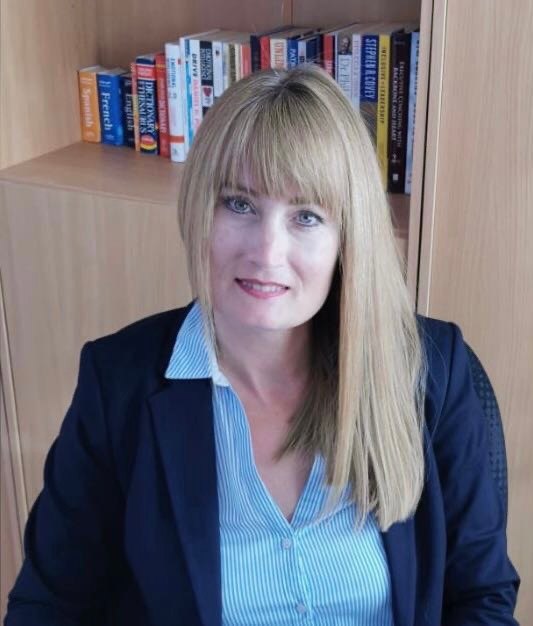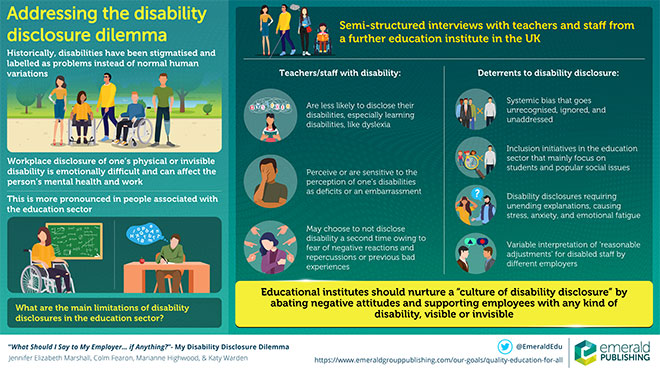Author: Jennifer Elizabeth Marshall
 Perceived deficits
Perceived deficits
Throughout history, society has largely viewed disabilities as problems to be solved, rather than as accepted human variations. In the UK, in the year ending June 2021, "working disabled people were less likely to work as managers, directors and senior officials or in professional occupations than working non-disabled people" (ONS, 2022).
In a recent study conducted in a Further Education institute, it was unsurprising to discover that disabled teachers were less likely to apply for promotions due to self-perceptions of disability as a deficit. Words such as "problem", "issue" and "wrong" were repeatedly used to describe disabilities, particularly specific learning differences such as dyslexia (Marshall et al, 2020). Words such as "fear", "fearful", "frightened", "scared", "scary", "hiding" and "come out" were frequently used in relation to disability disclosure (Marshall et al, 2020). Humiliation caused by self-perceptions of disabilities as "deficits" led to fear of adverse consequences, and subsequently, employees with invisible disabilities remained 'in the closet'. Paradoxically, this silence perpetuated stigmatisation and a sense of shame.
Disablism and ablism
Whilst introducing initiatives to encourage employees with invisible disabilities to 'come out' may appear an obvious solution to addressing harmful internal monolog, dominant discourses of "ableism" silence disabled people and perpetuate a society in which they are marginalised. Inclusion agendas within the Education sector focus predominantly on students and issues currently highlighted by the media, such as racism. It could be argued that ablism and disablism against employees are systemic issues that are underrated and ignored. For employees who 'come out' as disabled, perceptions of disability as a deficit creates vulnerability to disablism. Consequently, it is unsurprising that employees with an invisible disability may choose to remain silent.
'Coming out'
'Coming out' is not a one-time event, but rather an endless process that causes stress, anxiety, and emotional fatigue. Disclosure does not eliminate or reduce feelings of anxiety, nor does it guarantee future disclosure. Once 'out', perceived negative reactions and consequences of disclosure may deter an employee from disclosing again in the future.
'Reasonable' adjustments
The Equality Act 2010 requires Education providers to make 'reasonable adjustments' for disabled employees and students alike. However, disability disclosure is commonly thought to be an essential prerequisite to reasonable adjustments. The unlikelihood of employee disclosure generates inequity that may inadvertently impact the student experience.
Disabled employees observe whether their institution is paying lip service to inclusion, or whether it is doing what it claims to do, i.e., whether adjustments are provided for disabled employees and students, and if so, how these adjustments, and the disability itself are viewed by leaders, managers, and colleagues. One might question how disabled students are perceived and how these perceptions may impact disabled employees. Attitudes about what may be deemed a 'reasonable' adjustment may also influence disclosure decisions.
Addressing inequities
The Education sector plays a critical role in addressing the inequities faced by the workforce, students, and in society. Expecting disclosure is unrealistic when disabilities continue to be perceived as deficits. Education leaders must take action to transform culture by boldly addressing damaging attitudes about disabilities and the anxieties that surround 'coming out'.
References
-
Marshall, J.E., Fearon, C., Highwood, M. and Warden, K. (2020), ""What should I say to my employer… if anything?"- My disability disclosure dilemma", International Journal of Educational Management, Vol. 34 (7), pp. 1105-1117.
-
Office for National Statistics (2022) Census 2021 (Accessed: 10 June 2022).

“What should I say to my employer… if anything?”- My disability disclosure dilemma
Jennifer Elizabeth Marshall, Colm Fearon, Marianne Highwood, Katy Warden
Research exploring the key issues surrounding teacher/staff disability disclosures in the UK's further education sector.
> View the infographic | > Read the full article
What's in the infographic
Addressing the disability disclosure dilemma
Historically, disabilities have been stigmatised and labelled as problems instead of normal human variations.
Workplace disclosure of one's physical or invisible disability is emotionally difficult and can affect the person's mental health and work.
This is more pronounced in people associated with the education sector.
What are the main limitations of disability disclosures in the education sector?
Semi-structured interviews with teachers and staff from a further education institute in the UK
Teachers/staff with disability:
- Are less likely to disclose their disabilities, especially learning disabilities, like dyslexia
- Perceive or are sensitive to the perception of one's disabilities as deficits or an embarrassment
- May choose to not disclose disability a second time owing to fear of negative reactions and repercussions or previous bad experiences
Deterrents to disability disclosure:
- Systemic bias that goes unrecognised, ignored, and unaddressed
- Inclusion initiatives in the education sector that mainly focus on students and popular social issues
- Disability disclosures requiring unending explanations, causing stress, anxiety, and emotional fatigue
- Variable interpretation of 'reasonable adjustments' for disabled staff by different employers
Educational institutes should nurture a "culture of disability disclosure" by abating negative attitudes and supporting employees with any kind of disability, visible or invisible.
"What Should I Say to My Employer… if Anything?"- My Disability Disclosure Dilemma
Jennifer Elizabeth Marshall, Colm Fearon, Marianne Highwood, & Katy Warden

Quality education for all
We believe in quality education for everyone, everywhere and by highlighting the issue and working with experts in the field, we can start to find ways we can all be part of the solution.
